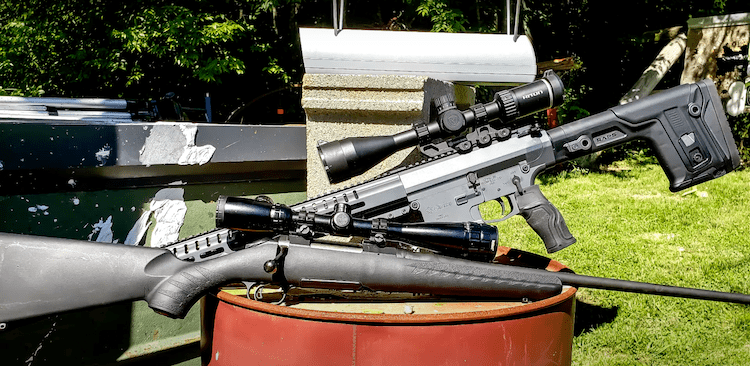The Differences Between Bolt Action and Semi-Automatic Rifles

A great debate we often encounter in the rifle scene is about the difference between a bolt action rifle and a semi-automatic rifle and which is better. You'll learn that the answer isn't as direct as you might have hoped. Let's dive into what sets them apart.
For more on bolt action rifles, see Barrett Rifles’s guide on the subject.
Key Takeaways
- Semi-automatic rifles have a faster rate of fire due to their automatic cycling, whereas bolt action rifles require manual cycling of the bolt, leading to a slower firing rate.
- Bolt action rifles typically have stronger felt recoil, while semi-automatic rifles have reduced perceived recoil since some energy is used to cycle the action.
- Due to their simpler design, bolt action rifles are generally more reliable with fewer malfunctions.
Bolt-Action vs Semi-autos: What Is the Difference?
To break this down and identify the core differences, we’re going to cover some key aspects that make up these rifles.
Gas Release
Both these rifles use different mechanisms to eject used cartridges and load new rounds. When you fire a bolt action rifle, the cartridge is ignited in the chamber, and the expanding gasses send the bullet down the barrel. However, the action stops there, requiring the shooter to manually operate the bolt to eject the used cartridge and chamber a new round.
In semi-automatic rifles, the same initial process happens, just like in bolt-action rifles. However, part of the gas released is used to cycle the action automatically, ejecting the used cartridge and chambering a new round. This difference allows semi-automatic rifles to fire much more quickly as the action is automatically cycled using the released gas.
Mechanics

A semi-automatic rifle has more moving parts, which can potentially affect precision during the firing cycle, especially at longer ranges.
‘Mechanics’ generally refers to how the components of a rifle work – the moving components of a rifle will influence its performance. Now, the bolt-action rifle has fewer moving parts. After all, the only moving part is the bolt itself, which you operate.
On the other hand, a semi-automatic rifle has more moving parts, like the upper or lower receiver involved in cycling the action. This increased mechanical complexity can potentially affect precision, especially if there's variability in how the parts move or align with each shot.
Recoil
Bolt action and semi-automatic rifles manage recoil differently. A bolt-action has a single recoil stage, which is from the muzzle to the rear, pushing the stock towards the shooter's shoulder.

Bolt action rifles have a single stage of recoil, whereas semi-automatic has three stages.
In other words, when a shot is fired, the energy from the cartridge explosion exerts force directly backward. And since there isn't any mechanism to absorb part of this energy, the shooter will experience the full force of this recoil.
Semi-automatic rifles have three stages of recoil, which include when the bullet leaves the barrel, when the bolt moves, and when the bolt picks up the next bullet. Part of the energy produced from firing a bullet is used to cycle the action, meaning the user feels less recoil.
Malfunctions
Any equipment with moving parts will eventually malfunction. Some of the malfunctioning issues you may see in a bolt action rifle include:
- The firing pin possibly failing to work if the bolt is closed too quickly or with excessive force, potentially leading to damage or misalignment of the firing pin, resulting in a failure to fire.
- Failure to fire despite pulling the trigger. Common causes include a faulty firing pin, bad ammunition, or problems with the trigger mechanism.
- Failure to feed, which occurs when the bolt action does not properly pick up a round from the magazine to chamber it. This can happen if there's an issue with the magazine or if the shooter operates the bolt incorrectly.
Now to the semi-automatic rifle. The common malfunctioning issues you'll experience include the following:
- The stovepipe may appear when a spent casing gets caught in the eject port.
- Double feeding, where two rounds feed into the chamber simultaneously, causing a jam. It's often caused by magazine issues.
- The round in the chamber may fail to fire despite pulling the trigger. This is often caused by bad ammunition or a faulty firing pin.
- The rifle may fail to extract the spent cartridge case from the chamber. In other instances, it might fail to eject the spent cartridge out of the ejection port.
- Loading malfunctions that can block the feed path. This is often caused by damaged magazines or mechanical issues.
Performance

While a bolt-action rifle is an efficient weapon, it generally has a slower rate of fire due to the manual operation of the bolt between each shot.
Performance is one of the most important factors to consider when looking for a rifle. Imagine you're in a scenario involving multiple targets, like a shooting competition. In such an instance, we suggest a semi-automatic rifle. That's because it has a higher rate of fire, which can be crucial in situations requiring you to engage multiple targets quickly.
While a bolt-action rifle is an efficient weapon, it has a slower rate of fire because of the need for manual cycling of the bolt. This fact makes it less ideal in a scenario requiring rapid shooting.
How about performance when it comes to hunting? Well, most hunters prefer bolt-action rifles as they are more precise, especially in large-game hunting. It’s accurate and reliable, especially when you only have one chance to take a clean shot from a distance.
A semi-automatic rifle can also be used for hunting, but specifically when you're dealing with multiple targets like fast-moving game or vermin control. That’s when the quick-firing becomes a standout feature in a hunting scenario.
Cartridges

Bolt action rifles are typically lighter with fewer components, which can make them more streamlined.
The main difference in cartridges between bolt action and semi-automatic rifles is their design and functionality. Semi-automatic rifles require cartridges that generate enough pressure for reliable cycling, with a focus on smooth feeding and extraction.
Bolt action rifles can accommodate a wider range of cartridges, including those with higher power and specialized designs, due to their manual operation mechanism. This flexibility is great for those who like having the variety plus higher calibers to choose from.
Bottom Line
Both types of rifles have scenarios where they come in handy. While semi-autos aren't as precise as bolt actions, they compensate with less recoil and greater firepower. However, remember they malfunction a lot and will have you visiting the gunsmith more than you would like.

Most hunters prefer bolt-action rifles because of their precision, range, and effectiveness, especially in large-game hunting.
On the other hand, a bolt-action rifle may have fewer malfunctioning issues, but in combat situations, its slower fire rate is a disadvantage against semi-autos.
Bio
Oscar Taylor is the owner of BarrettRifles.com, a world-leading blog for all things scopes and firearms. He has been an avid outdoorsman all his life. He’s hunted and fished most of the Eastern United States for over three decades. During his tenure as a hunter, he has hunted almost every North American game animal with either a rifle or a bow. He’s taken down more smaller game animals than you can count. He hunts, ducks, rabbits, birds, squirrels, and the occasional coyote.



2 comments
I get your point Jeremy; although, I do disagree with it. As for me, I much prefer a semi auto due to its reduced level of recoil as my experience with higher caliber bolt action rifles is that they kick like a mule.
Considering the recent experience in this country with mass shootings, it t seems hard to justify having fully automatic weapons available to civilians for the small advantage they bring to sportsmen.